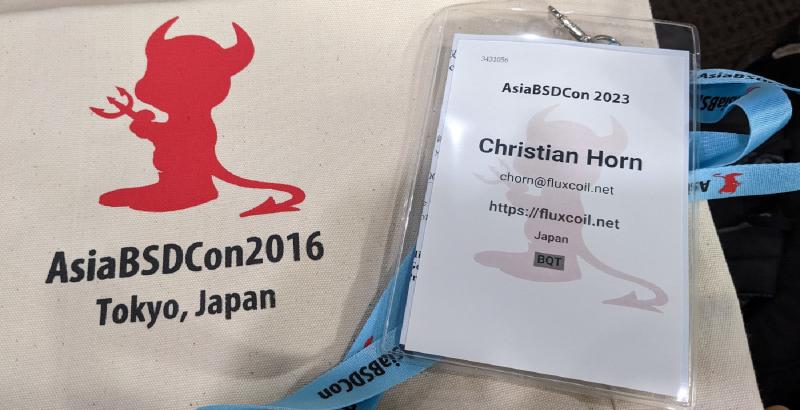1: What’s BSD + my BSD history
I mostly use Linux, but since the time of the Linux Install parties with the Thüringer Linux User Group, I’m also using BSD. I was lucky enough to meet many BSD folks when I lived in Munich.
What’s BSD, after all? My summary: Unix operating systems, mostly with code bases older than Linux. The biggest 3 variants, each with it’s own goals:
- emphasizing security: OpenBSD
- emphasizing performance, and desktop usage: FreeBSD
- emphasizing code cleanness and purity, as well as running on many different architectures: NetBSD
Linux distros are constructed of the Linux kernel, and many GNU software pieces like glibc and utilities ontop. The BSDs include not only their kernel, but also their own set of utilities. Much software like Apache webserver or Xorg is usable on both, BSD and Linux.
The development of Linux and the BSD’s is happening differently: Linux has more active developers, the codebase is huge compared to the BSD’s, things change often. BSD sees less movement, so you are likely to find a config file in the same place, also in new versions.
At my previous employer I was running OpenBSD on Sun sparc hardware, also now I have a Sun UltraSPARC 5 running NetBSD. To the folks at AsiaBSDCon I advertised the Sega Dreamcast, Playstation 2 and Playstation 3: all of these are still available at ‘hard off’ stores in Tokyo, and can run BSD.
2: Preparing for AsiaBSDCon: installing BSD on the Thinkpad
I’ve been at various Linux conferences, as well as conferences dedicated to OpenSource in general, like FOSDEM. AsiaBSDCon was announced for Tokyo, 45min in cycling distance from where I live, so I registered.
Using Linux on the destop since many years, I challened myself to get one of OpenBSD/FreeBSD/NetBSD running on a Thinkpad, so I could use it at the conference.
My requirements:
- My homedir needs to be encrypted (it’s 2023, right? When a laptop is lost, the data should not be easily readible)
- support for the NVMe support, and wlan
- Xorg, Firefox, audio output
Nice to have:
- suspend to memory
- UEFI
- Japanese fonts, to read pages with Kanji
- Japanese input method, so ability to input Kanji
In short, the 3 variants can do all of this. I started to investigate disk encryption: possible with all BSD’s, but it seemed so complex for NetBSD that I skipped that one. My NVMe and wlan were nicely supported on both FreeBSD/OpenBSD, also Xorg with Firefox were easy to setup, and Japanese fonts. Suspend to memory worked also on both, though not with closing the lid but manually executing ‘zzz’.
Japanese input method was easier to setup on FreeBSD than on OpenBSD. All 3 BSD’s have excellent handbooks and man pages, just installation of the Japanese input method was not really well documented.
So, equipped with OpenBSD on my Thinkpad I started the first conference day.
3: AsiaBSDCon 2023
The con happened in a university. Normal attendees did pay for attendence, and there were sponsors. BSDCon covered flight costs for the presentors, I guess most money was spent there.
Presentations started, and were quite interesting for me. If a user wants to do something, Linux has often many ways and software pieces available. For example there are many file systems, with their own features and level of stability. The BSD’s have for many tasks one single piece of software, but that is then covering a majority of the use cases/most frequently requested functions.
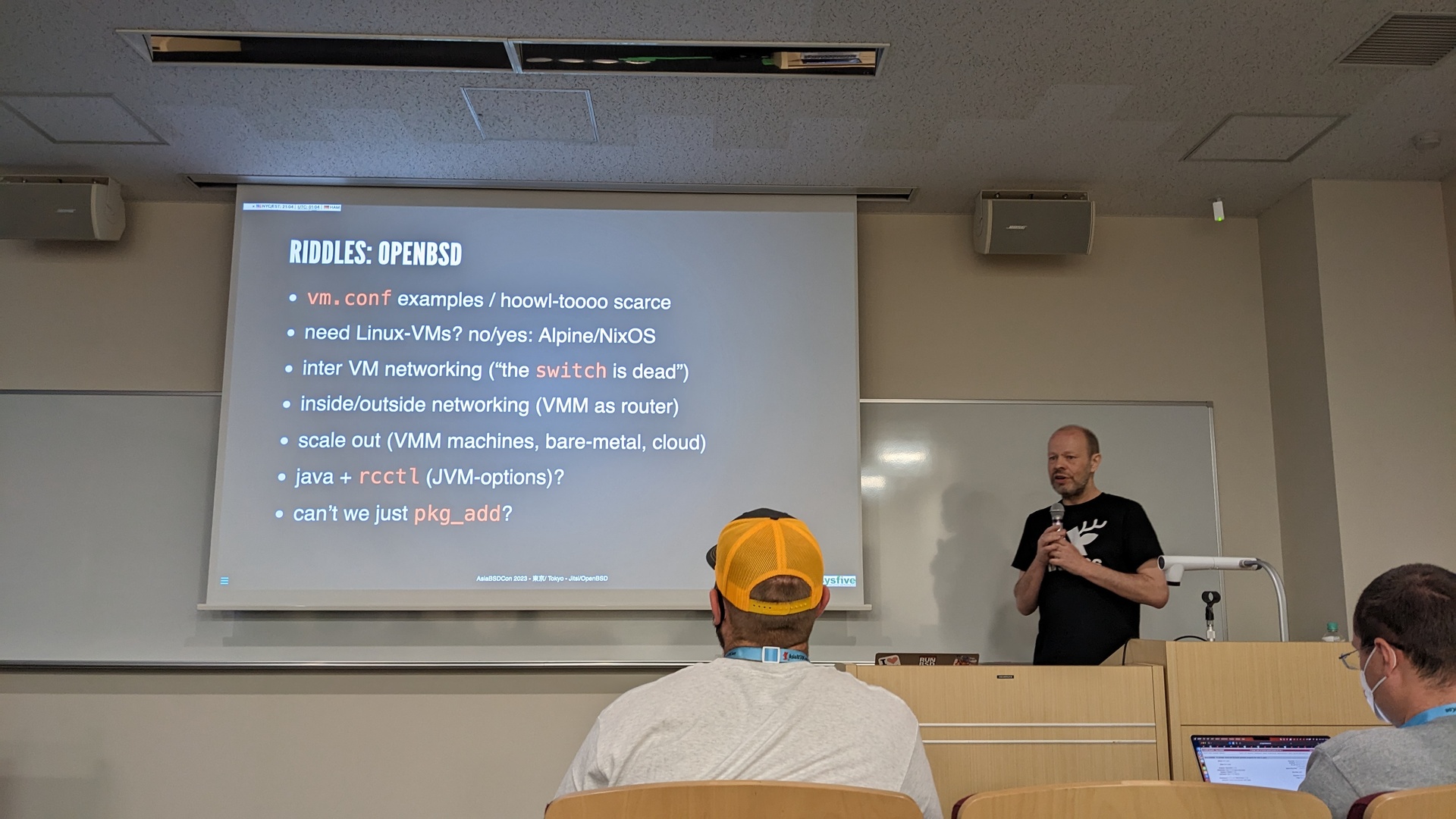
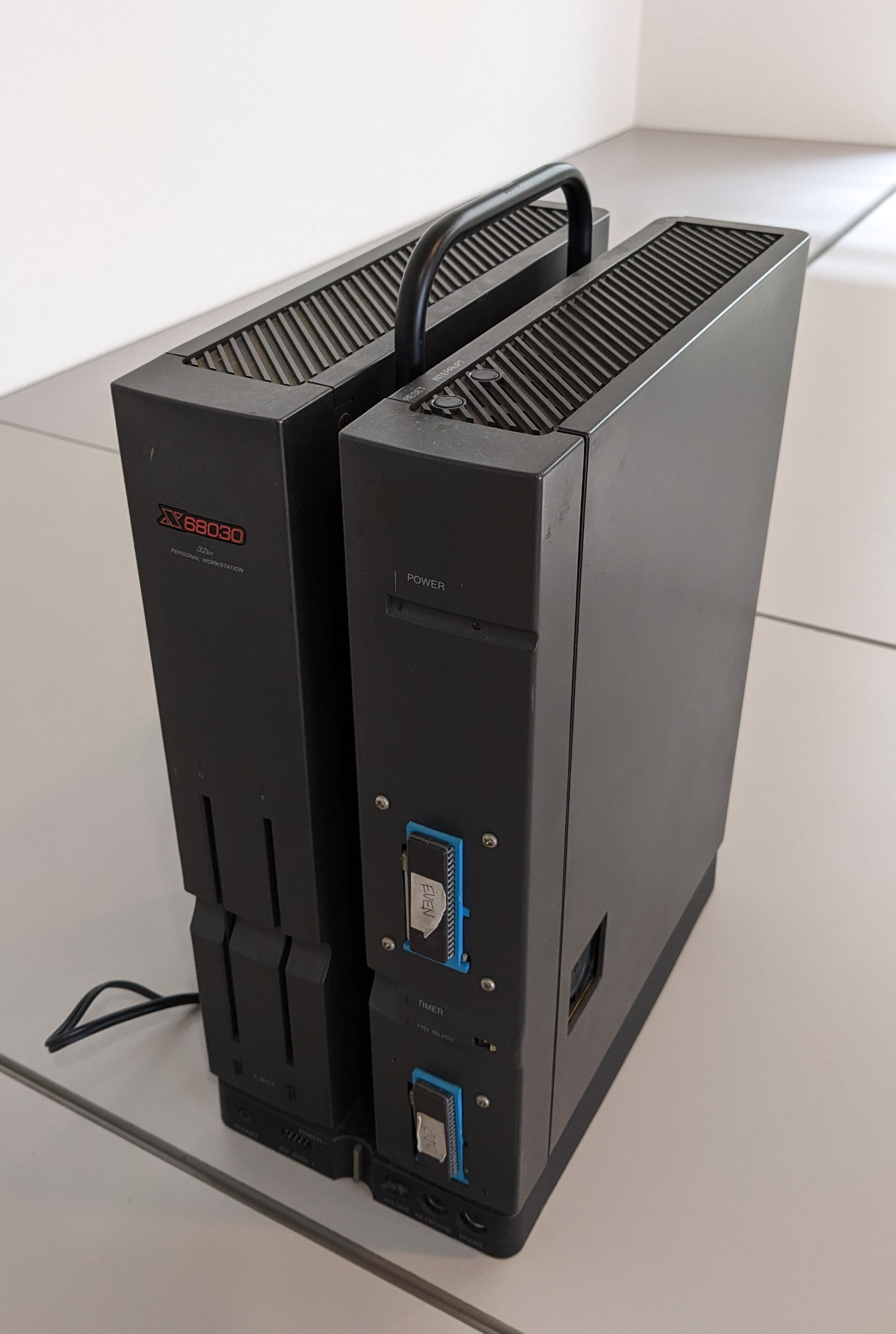
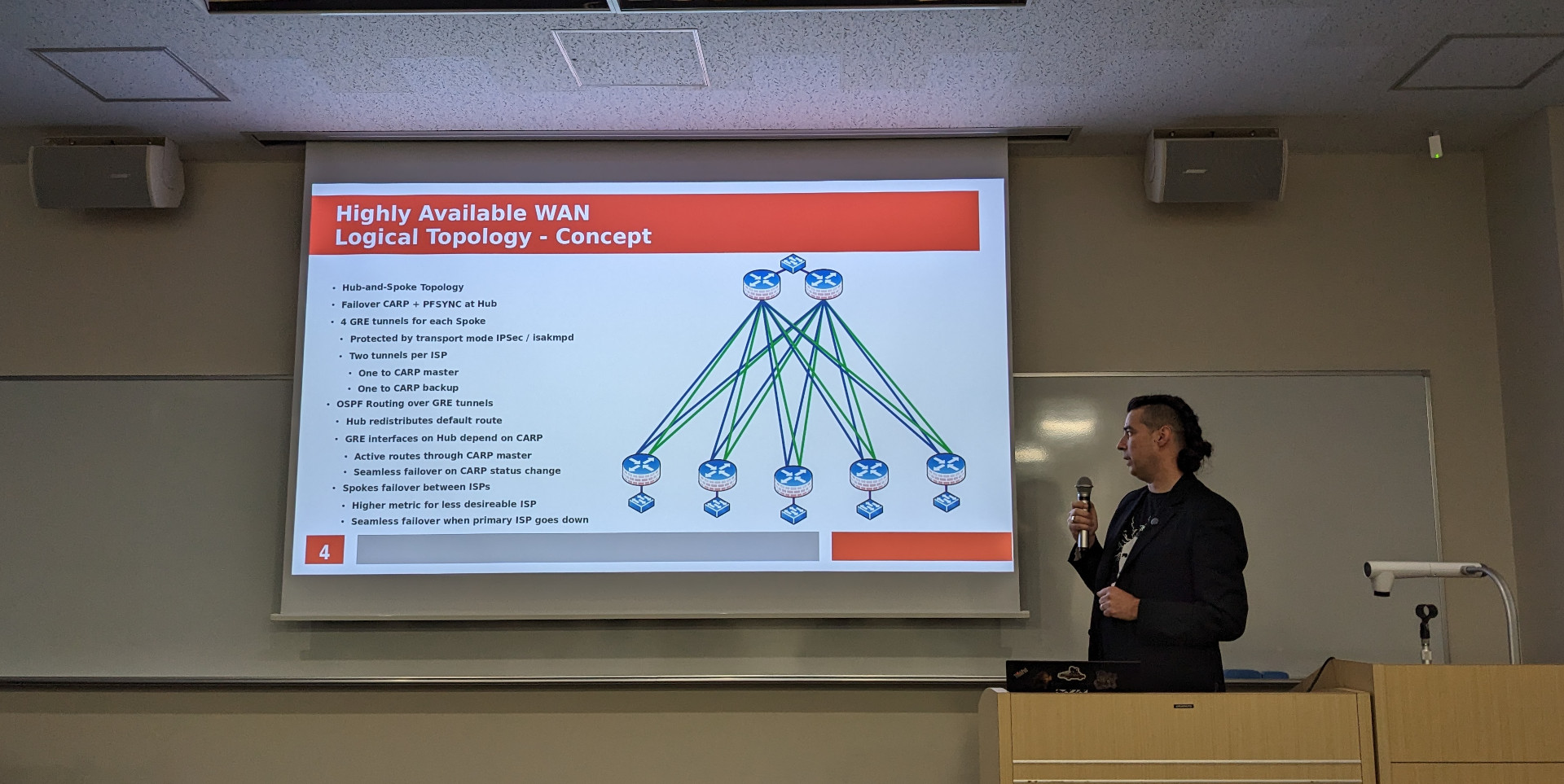
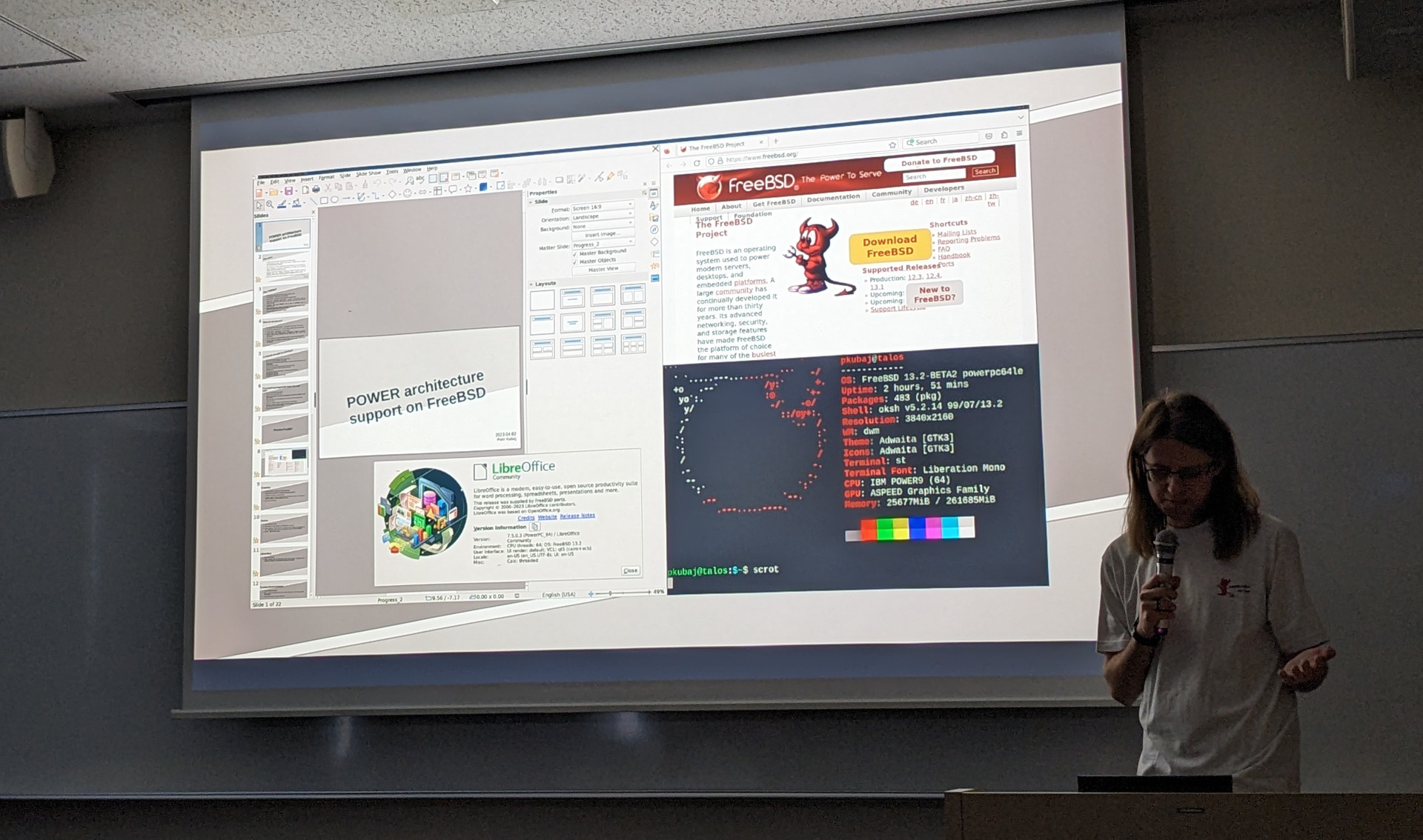
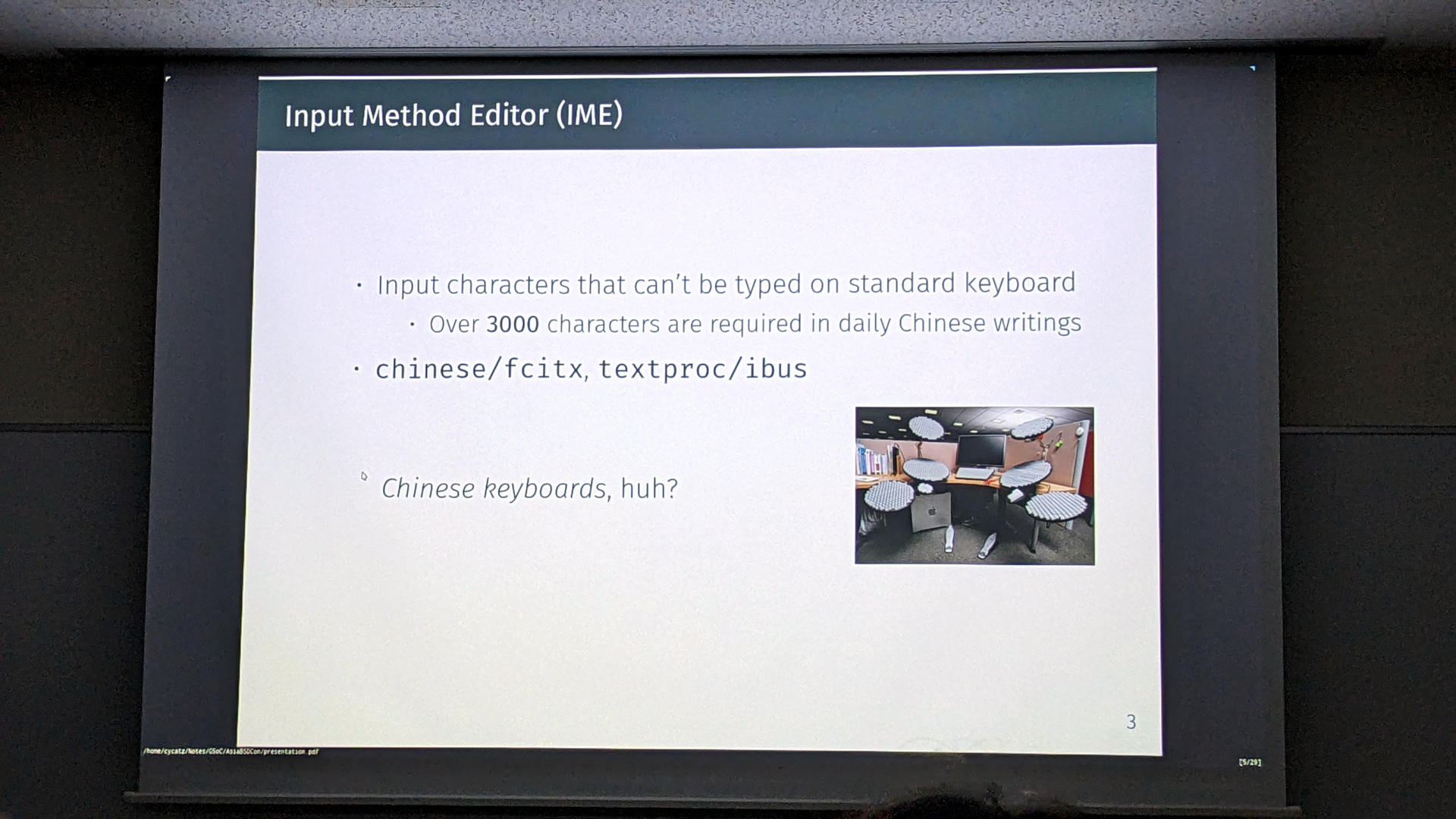
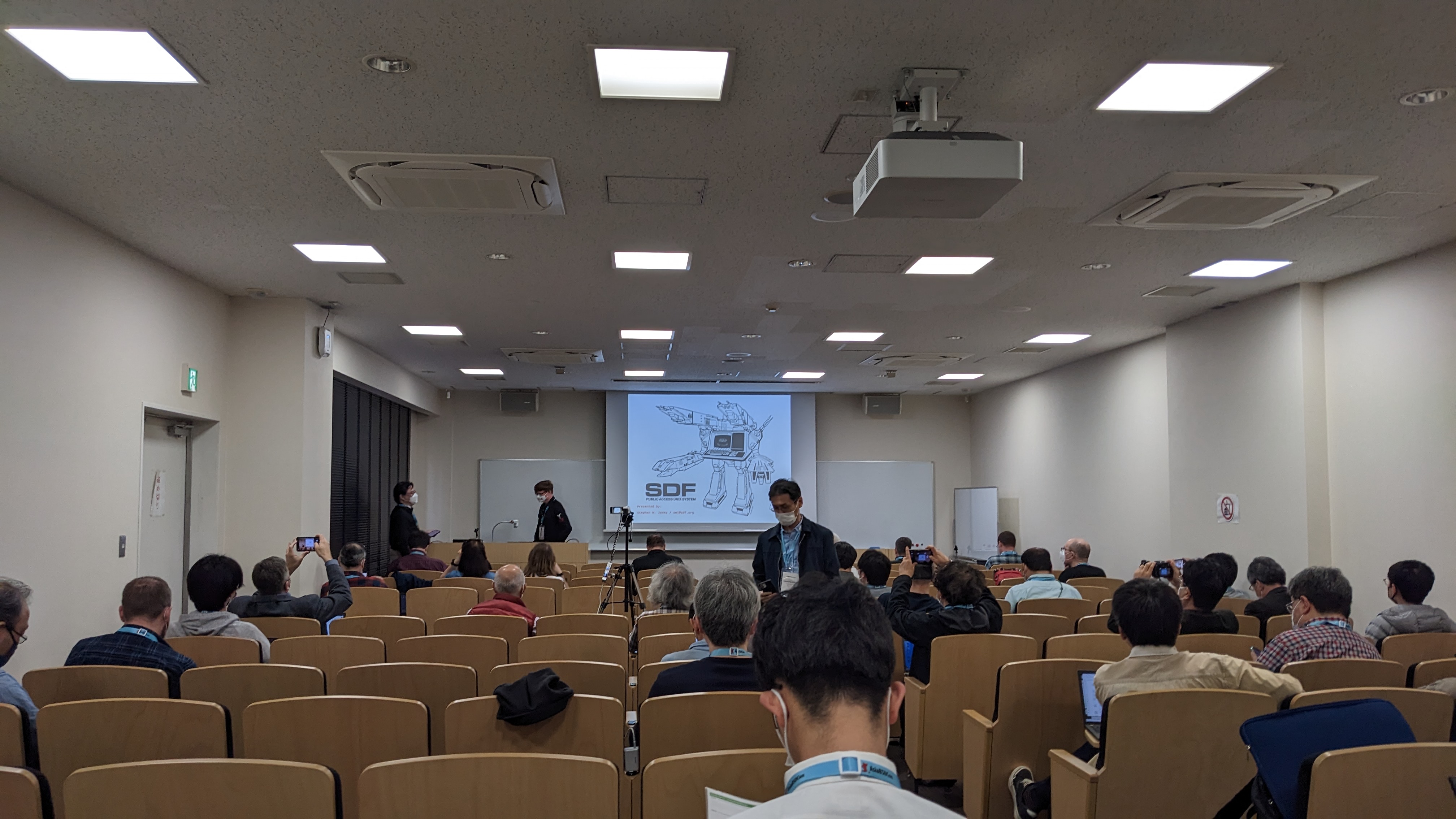
Between the sessions, it’s easy to get to talk with other attendees. Chatting is as nice as with Linux folks and colleagues, one feels on common ground with most things. It’s also great to go into politics: fantastic chats comparing Japan/Germany/USA. Or hearing about the state of things in Hong Kong, from someone living there. Also specialists from Ukraina, now living in the US.
NetBSD is available for many architectures, there was also a both showing many of these. For the first time I saw a Sharp X68030 system, a PC from the DOS era, produced in Japan.
I learned much in the sessions. The power architecture is also used in desktop systems, supported by FreeBSD. One presentor had written an input method for entering Kanji - but not for Xorg, his input method workds directly with the terminal in plain text mode - fascinating idea!
On Saturday evening, we had a banquette/dinner, in a building attached to a beautiful shrine. It’s the last days of cherry blooming here in Tokyo, and there was also a dancing event going on.
Food and talks at the dinner were very nice.


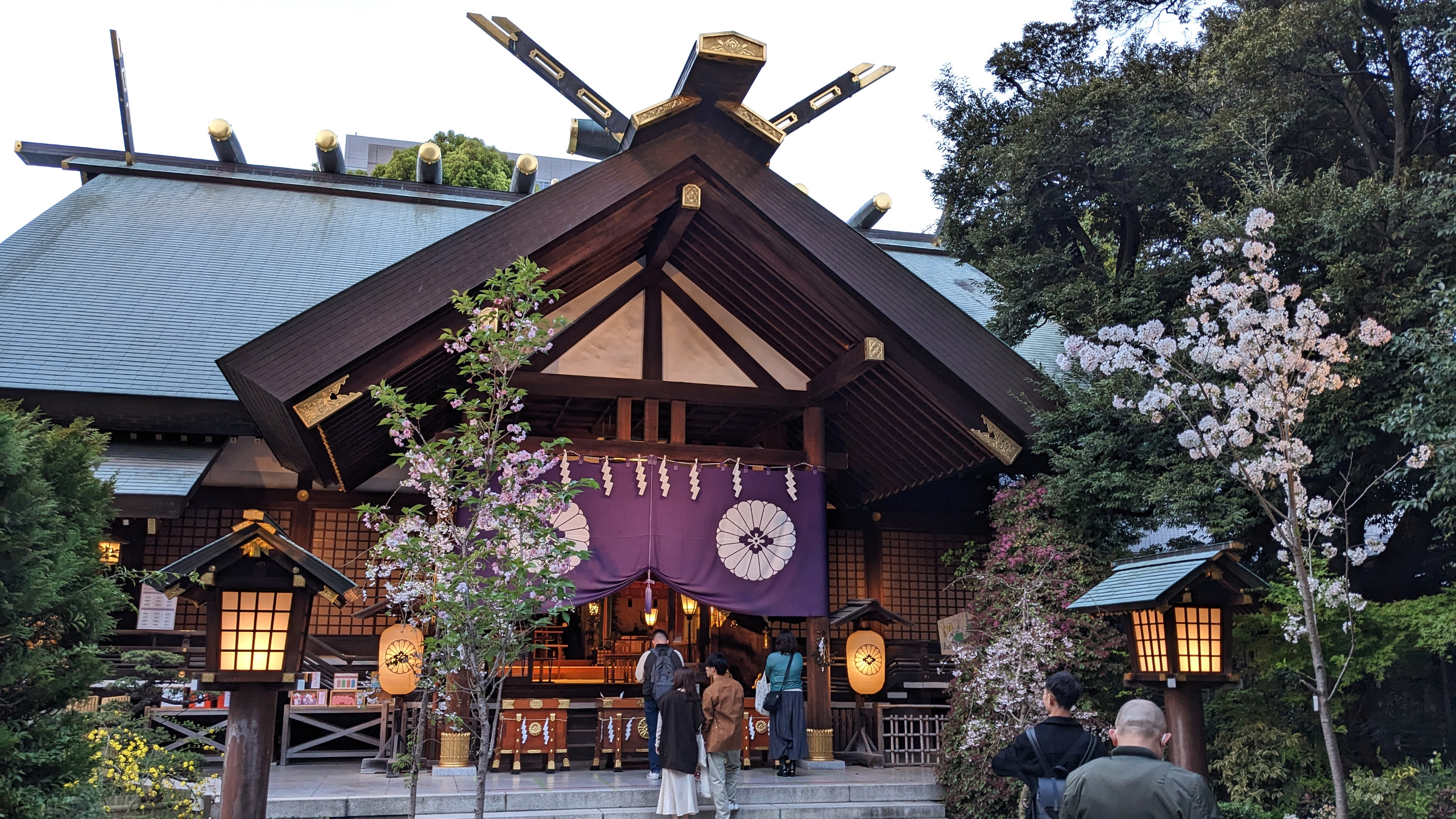
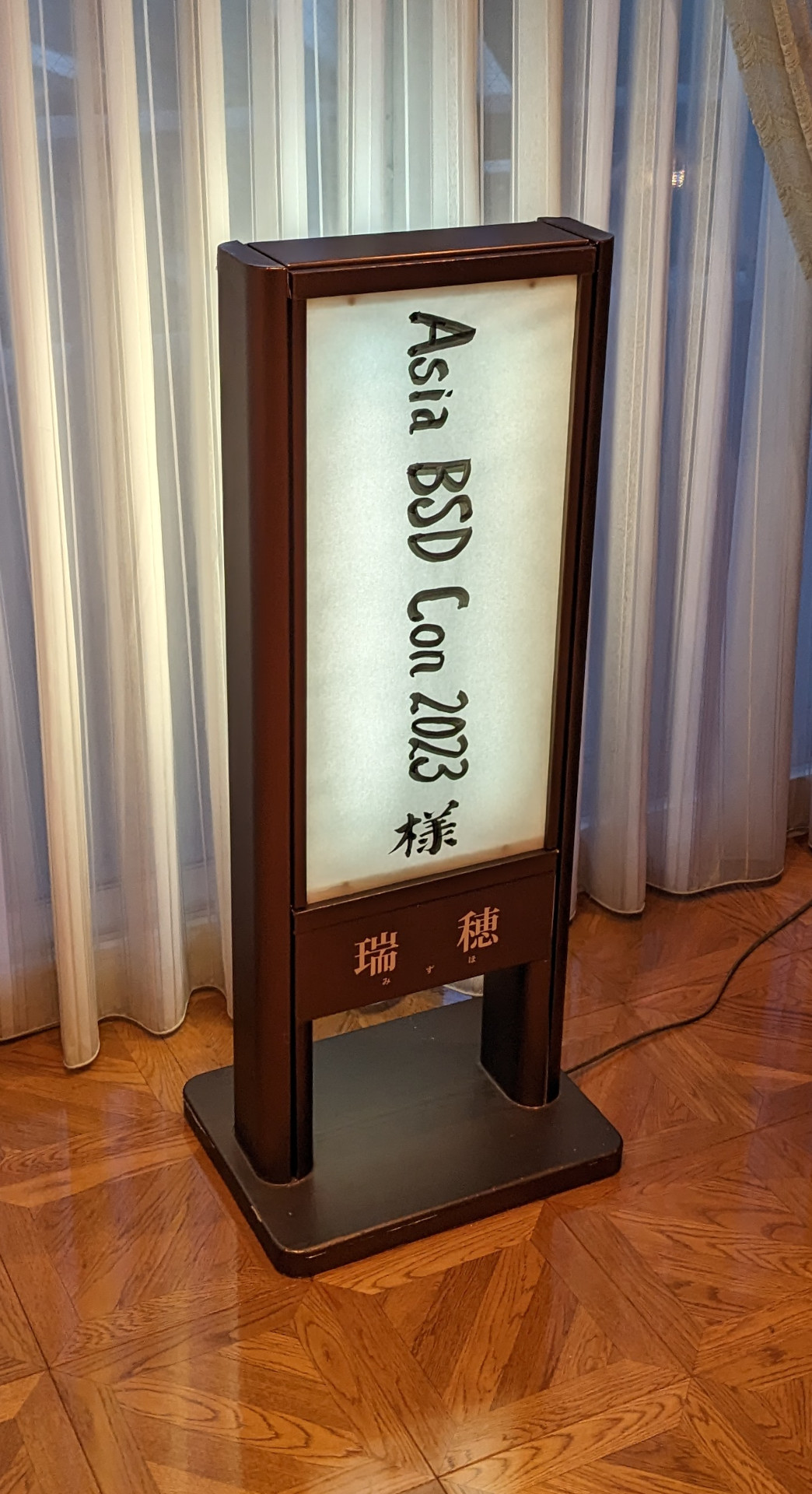
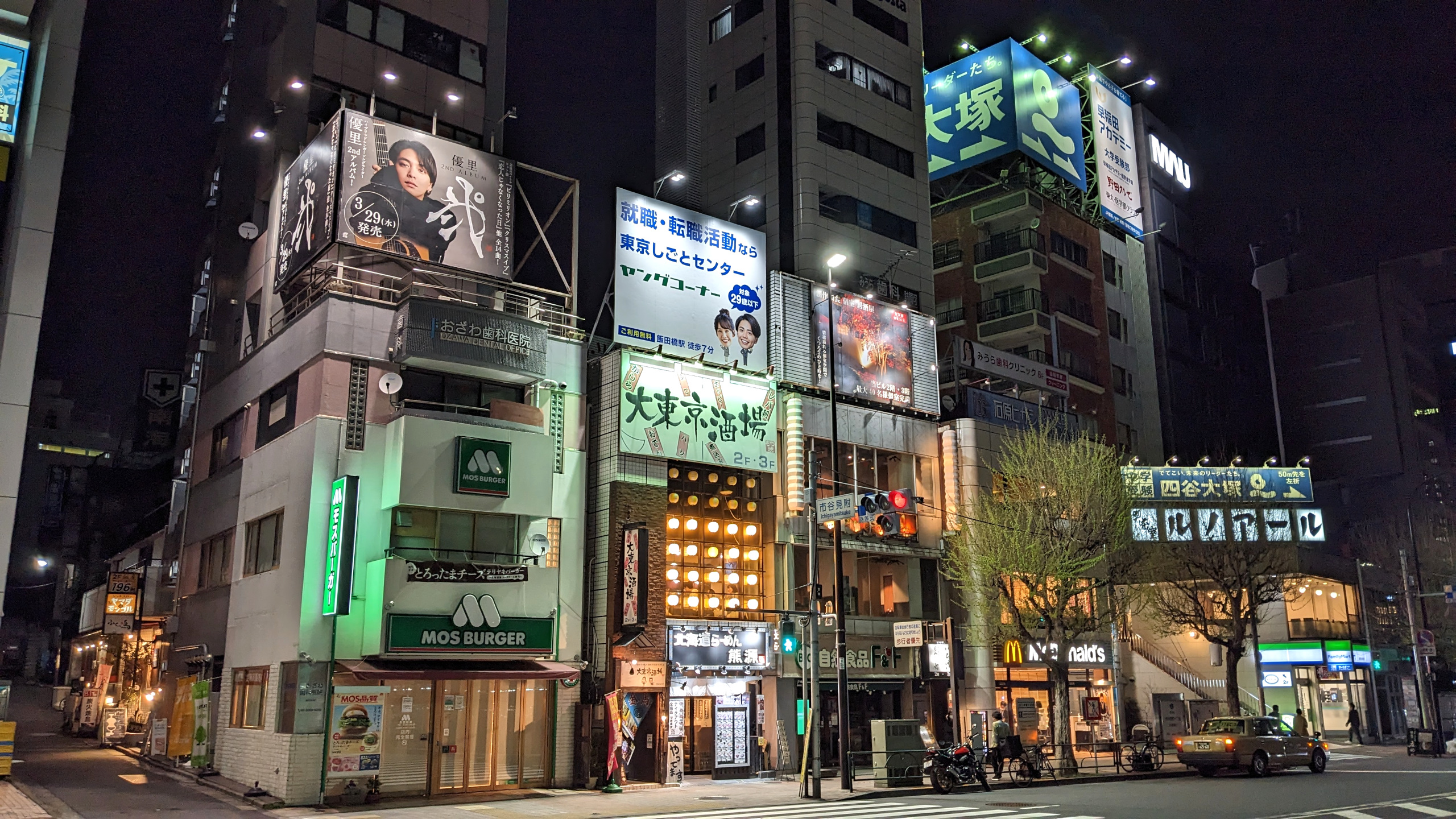
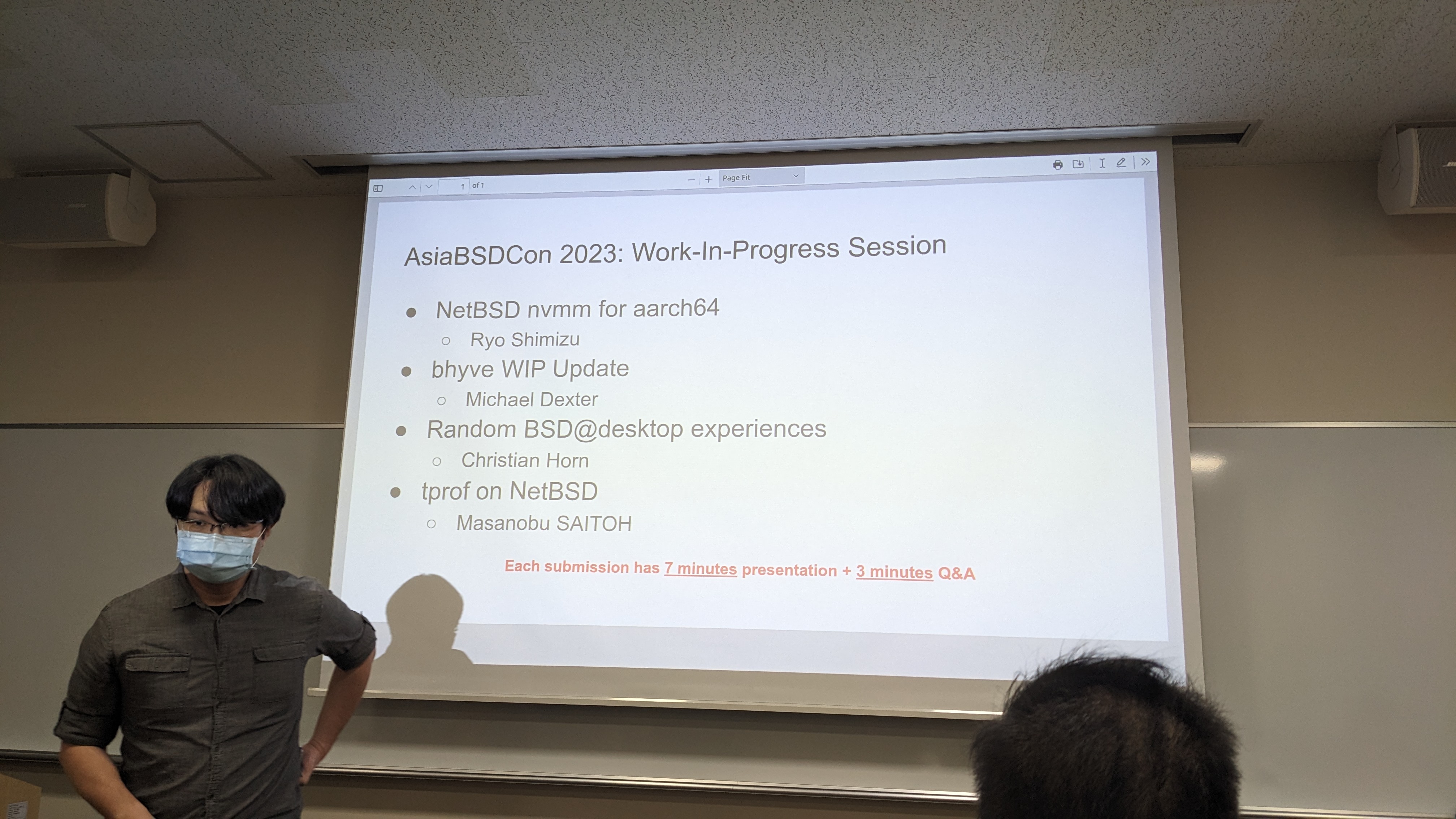
4: Ideas I took home with me
One interesting idea was about storage. We all know the Fio tool, with which we can do I/O load on storage. But which I/O load to choose? Reading, or writing, or both - in which percentages? Which block sizes? Discussing with an other participant, we noticed that this is missing: tool which for example monitors I/O on a production system for an hour and afterwards tells us which I/O patterns it had seen fly by - that could then be usable to do the same load with fio.
BSD vs. Linux: so far, I assumed one big driver for companies to use BSD instead of Linux: taking the code, extending it, and due to the license not having to give back the modified code. I met NetBSD developers from a Japanese ISP who had an other reason: “When we decided for an OS for our router hardware, Linux would crash and just was not stable enough”.
Also, with BSD there is less movement in the code than with Linux. I experienced that with the BSD@desktop testing myself: you can come back after many years and find the config files in the same place. This makes updating over a long time and many releases easier.
I also had a nice chat with a TrueNAS specialist. TrueNAS was called FreeNAS in the past, they are an appliance offering storage. Historically they were running on BSD, but following customer requests they also offer TrueNAS now based on Linux: customers wanted to run Linux containers, put the spare cpu cycles of the storage into usage. Most interesting: for most scenarios the TrueNAS folks see BSD in advantage over Linux, performance wise. They are doing performance comparisons. Surely, they have run and optimized the BSD based systems since many years. This really really asking for a more open comparison. For example: a party, maybe an ISP, should offer 2 systems of identical hardware. One installed with BSD, one with Linux. Then there would be time span where folks over the internet could request benchmarks to be run, and where everybody could suggest optimizations, for example as pull requests into a git, and the requests would end up in Ansible playbooks to be implemented on the systems. After for example 2 months, a final workload/benchmark would then be run against both systems. We know capture the flag contests.. this would be an optimization contest.
Alternatively: offering for example 5 systems of the same type at an event, giving various communities (OpenBSD, NetBSD, Linux distros etc.) each one system, allowing them to optimize for one day for a use case, and at the end of the day doing a final run of a workload via network - and publishing the results.
We talked much about file systems: ZFS is one of the big topics, in Linux and BSD world. Due to it’s license, ZFS is not getting included into the upstream Linux kernel. When customers ask for ZFS, we from the Linux world try to understand which actual features they are after and suggest alternatives (ask me if interested..). ZFS is available with FreeBSD and NetBSD. The most interesting piece I learned: it’s not available natively with OpenBSD due to license issues.
5: Japan/logistic things
I was lucky having to commute just 45min by bike to the event, and that the weather was nice. Starting from April 1st, Japan is asking bikers to wear a helmet. The used term in Japanese is 努力義務, literally “you have to do your best to conform”. I pondered for a while what this would practically mean: bikers can now be stopped by the police and be reminded to wear a helmet, but there will be no punishment.
Around half of the visitors of BSDCon were foreigners, but we also had many Japanese.
Live streaming was available while the conference was going on, but as of April 4th no recordings seem available. I also did not see uploaded papers - so if you are interested in one of the topics I can scan that part from the printed proceedings. I shared my BSD@desktop experiences later as a mini presentation, the slides are here.
Looking forward to upcoming conferences!
